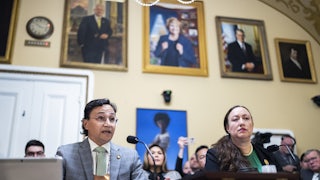More than 100 million Americans watched the Super Bowl in February. Interspersed in the Los Angeles Rams’ victory over the Cincinnati Bengals was a barrage of television ads that urged viewers to buy cryptocurrencies on crypto exchanges. Coinbase bounced a Q.R. code linking to its website around the screen for 30 seconds. (The link crashed.) Crypto.com featured basketball star LeBron James interacting with a younger version of himself and its motto, “Fortune Favors the Brave.” EToro showed a new user literally “going to the moon,” meaning that he reaped record rewards, with “social investing” on its platform.
But the most talked-about ad came from FTX, a crypto exchange run by billionaire Sam Bankman-Fried. It starred comedian Larry David of Seinfeld and Curb Your Enthusiasm fame learning about major inventions throughout history—the wheel, the fork, American democracy, the electric light bulb—and being skeptical that they would catch on. Then he is told about FTX, which another character describes as a “safe and easy way to get into crypto,” and passes on it again. It ends with the tagline “Don’t Be Like Larry.”
Depending on how you read it, that could be very good advice or very bad advice. A viewer who bought $1,000 in Bitcoin during the Super Bowl now owns roughly $380 worth of Bitcoin. Cryptocurrencies in general have seen a sharp downturn since peaking in the spring, and multiple crypto exchanges—Terra, Celsius, and others—have collapsed and lost some or all of their depositors’ funds. The most recent casualty is FTX itself, one of the industry’s largest players, which declared itself insolvent last week. It is unclear exactly how much its customers have lost—we’ll get into the reason why later—but as many as one million creditors may be affected, the company claimed in bankruptcy filings this week.
Much of the blame for this state of affairs falls on the people who run these companies. Bankman-Fried is now reportedly under investigation by the Securities and Exchange Commission, federal prosecutors in Manhattan, and local regulators in the Bahamas, where he is based. But a healthy share also appears to lie with the celebrities who helped introduce people to these products in the first place. A new class-action lawsuit filed in federal court on Friday aims to hold them responsible for it.
The complaint, filed by veteran litigator David Boies and other attorneys, targets a range of celebrities who appeared in FTX’s marketing and promotional materials. Tom Brady and Gisele Bündchen, the recently divorced couple who were listed as “brand ambassadors” for the company, receive top billing. Others include Canadian businessman and Shark Tank investor Kevin O’Leary; Jacksonville Jaguars quarterback Trevor Lawrence; MLB pitcher Shohei Ohtani; tennis star Naomi Osaka; retired baseball player David Ortiz; and basketball players Udonis Haslem, Steph Curry, and Shaquille O’Neal. Bankman-Fried and Larry David are also named.
The lawsuit alleges that FTX was a fundamentally fraudulent enterprise, which marketed unregulated securities to unsuspecting consumers. “The deceptive FTX Platform maintained by the FTX Entities was truly a house of cards, a Ponzi scheme where the FTX Entities shuffled customer funds between their opaque affiliated entities, using new investor funds obtained through investments in the [yield-bearing accounts] and loans to pay interest to the old ones and to attempt to maintain the appearance of liquidity,” the complaint claims. To further the scheme, FTX hired the aforementioned celebrities to promote its products, and they allegedly failed either to disclose their ties to the company or to conduct any due diligence on what it offered.
Much of what’s known about FTX’s internal finances comes from reporting by business journalists over the last fortnight, and it still remains murky. The exchange’s collapse came after Binance, a rival, dumped roughly a half-billion dollars of FTX’s primary cryptocurrency, which in turn led to a downward price spiral and a rush of customer withdrawals. The sudden outflows appear to have revealed a host of other irregularities. One is that FTX reportedly lent roughly $10 billion in customer deposits to Alameda Research, a trading firm that was part of the Bankman-Fried network of crypto companies. Reuters reported earlier this week that between $1 billion and $2 billion of these deposits weren’t among Alameda’s current assets, though it is unclear what happened to them.
Neither a law degree nor an accounting degree is needed to surmise that something illegal may have happened here. The Financial Times obtained a balance sheet that showed a number of, well, peculiarities that one does not normally find on such corporate documents. For one, there was an ominous entry titled “hidden, poorly labeled internal ‘fiat@’ [sic] account” that showed a negative liability of $8 billion. What’s more, most of the exchange’s remaining substantial holdings appeared to be in cryptocurrencies and tokens created by FTX itself, whose market value was now questionable at best. That discovery prompted this response from Bloomberg’s Matt Levine, a veteran financial reporter and lawyer, in his newsletter earlier this week:
I am not saying that all of FTX’s assets were made up. That desperation balance sheet lists dollar and yen accounts, stablecoins, unaffiliated cryptocurrencies, equities, venture investments, etc., all things that were not created or controlled by FTX. And that desperation balance sheet reflects FTX’s position after $5 billion of customer outflows last weekend; presumably FTX burned through its more liquid normal stuff (Bitcoin, dollars, etc.) to meet those withdrawals, so what was left was the weirdo cats and dogs. Still it is striking that the balance sheet that FTX circulated to potential rescuers consisted mostly of stuff it made up. Its balance sheet consisted mostly of stuff it made up! Stuff it made up! You can’t do that! That’s not how balance sheets work! That’s not how anything works!
The complaint goes on to list the times when the celebrities touted FTX’s products and reliability. None of them, save for one, had any experience in the financial industry—something that was touted as a point of credibility in their favor. An ad campaign featuring Steph Curry, for example, touted his inexperience as a reason for his endorsement. “I’m not an expert, and I don’t need to be,” he claimed. “With FTX I have everything I need to buy, sell, and trade crypto safely.” Shaquille O’Neal said in another ad that he was hoping to “help make crypto accessible for everyone.” Naomi Osaka, who allegedly received “an equity stake in FTX and payments in unspecified amounts of cryptocurrency,” signed on with the company with the goal of “getting more women interested to start investing in crypto.”
The only celebrity with financial experience was O’Leary, a Canadian businessman who used to co-host a CBC show on business and politics and is one of the prospective investors on Shark Tank. That may explain why his remarks came with a disclaimer. At the same time, O’Leary’s praise for FTX was arguably more effusive than that of the novices. “I have to disclose I’m a paid spokesperson to FTX and a shareholder there too, because we mentioned them,” he said at an event last month. “And [I’m] a big advocate for Sam, because he has two parents who are compliance lawyers.” (Bankman-Fried’s parents are both law professors at Stanford University.) He added: “If there’s ever a place I could be that I’m not gonna get in trouble, it’s going to be at FTX, so you know [they’re] great people, but he gets the job in compliance which is why he’s working so hard to get regulation.”
This would not be the first time that celebrities have been held accountable for marketing unregistered securities to their fans. In 2018, the Securities and Exchange Commission announced settled charges against boxer Floyd Mayweather and musician DJ Khaled for their role in promoting new cryptocurrencies. Both men urged fans to take part in buying a new coin during its “initial coin offering,” when it became generally available to the public, without disclosing that they had been paid by the coin’s creators to do so. “With no disclosure about the payments, Mayweather and Khaled’s ICO promotions may have appeared to be unbiased, rather than paid endorsements,” a SEC official said.
Last month, celebrity influencer Kim Kardashian paid $1.26 million in penalties as part of a deal with the SEC for promoting a cryptocurrency named EtheriumMax on Instagram. Kardashian received $260,000 in exchange for promoting the coin but did not disclose the payment. “This case is a reminder that, when celebrities or influencers endorse investment opportunities, including crypto asset securities, it doesn’t mean that those investment products are right for all investors,” SEC Chair Gary Gensler said. “We encourage investors to consider an investment’s potential risks and opportunities in light of their own financial goals.”
Neither of those cases came about as part of civil litigation claims by individual plaintiffs, who allege in the lawsuit that the participants violated state and federal securities laws. They are seeking an unspecified amount of damages. Regardless of the outcome of the class-action lawsuit, it may ultimately prove to be sufficient to prevent celebrities from dabbling in the crypto space in the future—and, accordingly, ensure that fewer consumers trust their money with what appear to be unregulated banks and unregistered securities. The average person and celebrity endorser might now take FTX’s advice from its Super Bowl commercial at face value: “Don’t be like Larry.”








